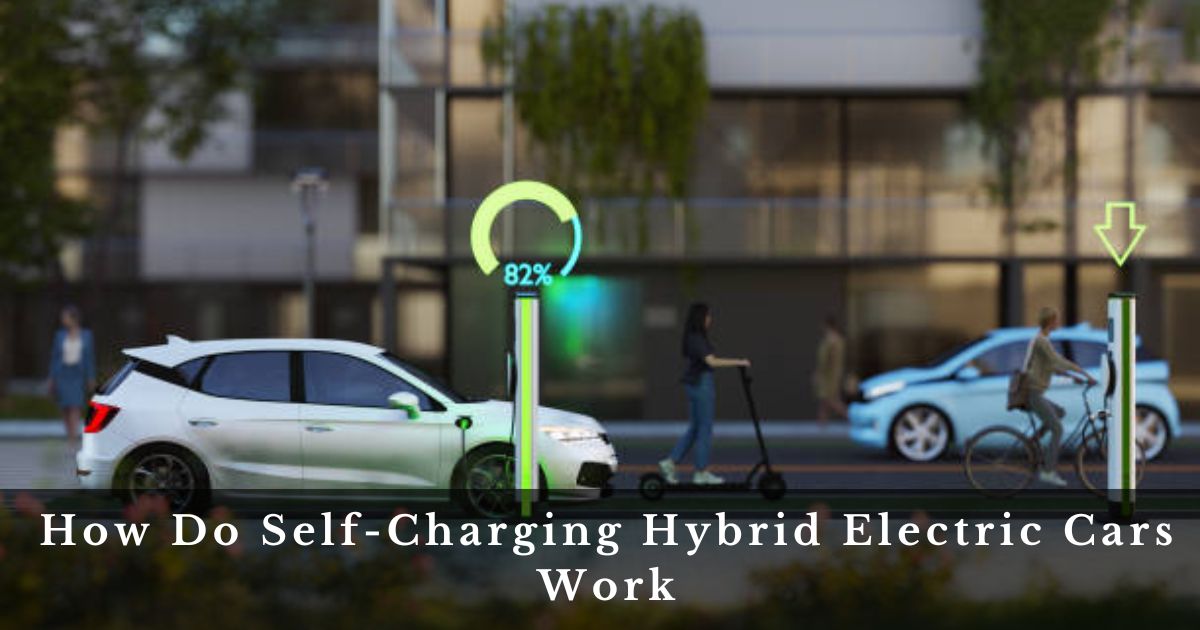How do self-charging hybrid electric cars work, Self-charging hybrid electric cars are becoming popular lately because they’re good for saving fuel and being kind to the environment. But how do they actually work? Let’s take a closer look and learn about the science behind self-charging hybrids.
Self-charging hybrid cars are vehicles that use both a gasoline engine and an electric motor to power themselves. They are designed to be more efficient and environmentally friendly than traditional cars that only use gasoline engines. In this article, we’ll explore how self-charging hybrid cars work in simple terms.
Understanding Hybrid Cars:
Hybrid cars have two power sources: a gasoline engine and an electric motor. The gasoline engine works like the one in a regular car, burning fuel to generate power. The electric motor, on the other hand, runs on electricity stored in a battery.
Battery Power:
One of the key components of a hybrid car is its battery. This battery stores electricity that is generated while the car is braking or decelerating. It’s like a reservoir that collects energy when the car doesn’t need it immediately.
Regenerative Braking:
When you hit the brakes in a hybrid car, something interesting happens. Instead of just slowing down the car, the electric motor actually works in reverse, acting as a generator. This process is called regenerative braking. It converts some of the car’s kinetic energy (motion) into electrical energy, which is then stored in the battery.
Dual Power Modes:
Hybrid cars can operate in two different modes: electric mode and hybrid mode. In electric mode, the car runs solely on electric power from the battery. This is great for short trips or driving in city traffic where speeds are lower. In hybrid mode, both the gasoline engine and the electric motor work together to power the car. This mode is used for higher speeds or when more power is needed, like during acceleration.
Smart Control System:
Hybrid cars have a smart control system that manages the flow of power between the gasoline engine, the electric motor, and the battery. This system determines the most efficient way to use the available energy based on factors like speed, load, and driving conditions.
Self-Charging Mechanism:
The term “self-charging” in hybrid cars refers to how they generate electricity to recharge the battery while driving. This happens primarily through regenerative braking, as mentioned earlier. Additionally, when the gasoline engine is running, it can also generate electricity to recharge the battery. So, as long as the car is moving or the engine is running, the battery stays charged without needing to be plugged in.
Fuel Efficiency:
One of the main benefits of self-charging hybrid cars is their improved fuel efficiency. By using a combination of gasoline and electricity, they can travel farther on a gallon of fuel compared to traditional cars. This means less money spent on gas and fewer emissions released into the environment.
Environmental Impact:
Because self-charging hybrid cars consume less fuel and produce fewer emissions, they have a smaller environmental footprint compared to conventional cars. They help reduce air pollution and greenhouse gas emissions, contributing to cleaner air and combating climate change.
Self-charging hybrid cars offer a practical and eco-friendly solution to transportation needs. By harnessing the power of both gasoline and electricity, they provide improved fuel efficiency and lower emissions. Understanding how these vehicles work can help us make informed choices about our transportation options and contribute to a cleaner, greener future.
Unique FAQs
Are self-charging hybrid electric cars the same as plug-in hybrids?
While both types of vehicles utilize a combination of gasoline and electric power, self-charging hybrids do not require external charging via a plug-in connection. Instead, they rely on regenerative braking and the gasoline engine to recharge the battery.
Do self-charging hybrids need to be plugged in to charge their batteries?
No, self-charging hybrids do not require external charging. The battery is charged automatically through the vehicle’s operation, primarily through regenerative braking and the gasoline engine.
Can self-charging hybrids operate solely on electric power?
Self-charging hybrids can operate on electric power alone for short distances at low speeds. However, their electric-only range is typically limited compared to plug-in hybrids or fully electric vehicles.
Are self-charging hybrids more expensive than traditional gasoline vehicles?
Generally, self-charging hybrids tend to have a higher upfront cost due to the additional technology involved, including the electric motor and battery pack. However, over time, their fuel savings can offset the initial investment.
What maintenance is required for the electric components of self-charging hybrids?
The electric components of self-charging hybrids, including the motor and battery pack, typically require minimal maintenance. However, it’s essential to follow the manufacturer’s recommendations for battery care and periodic inspections to ensure optimal performance.



